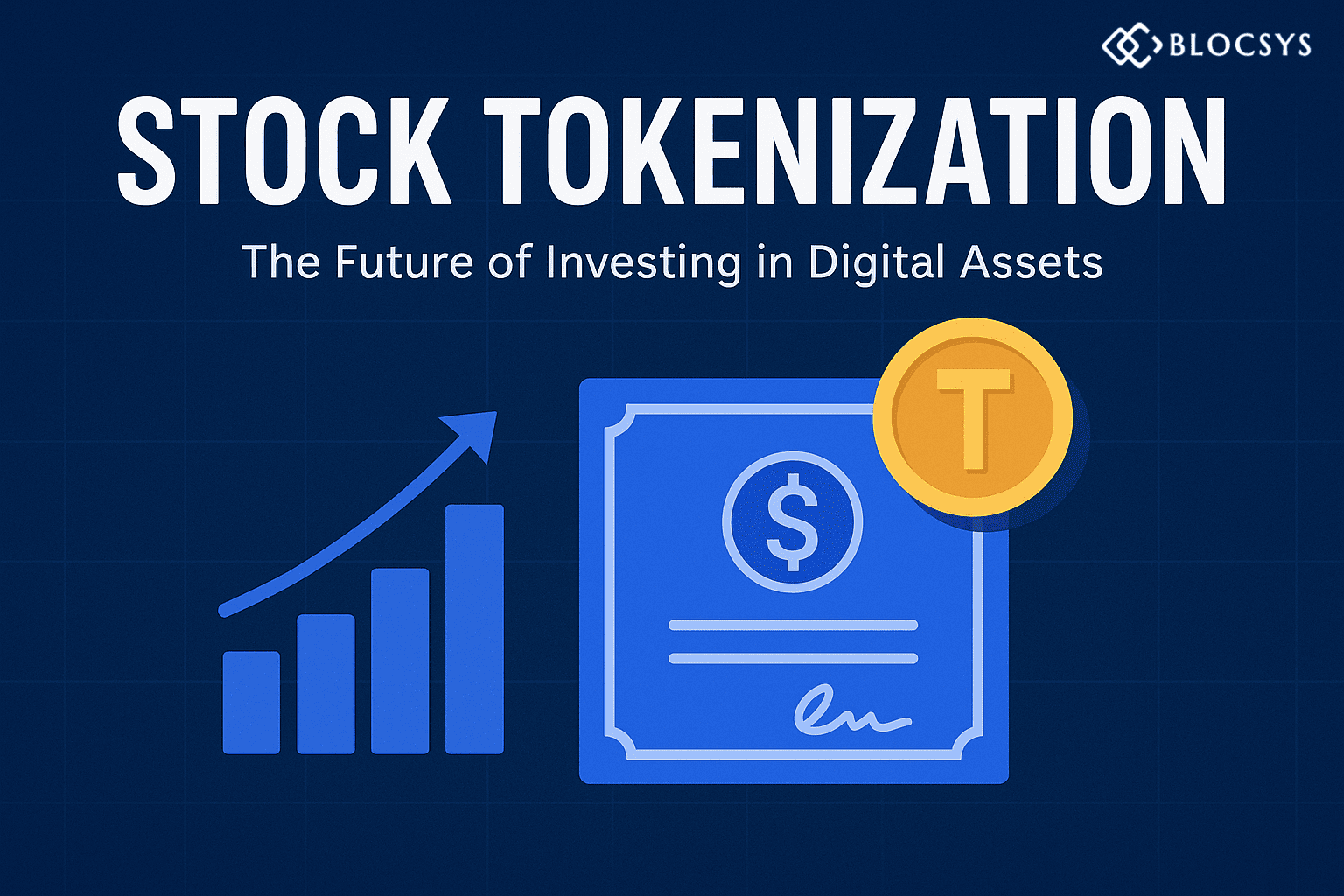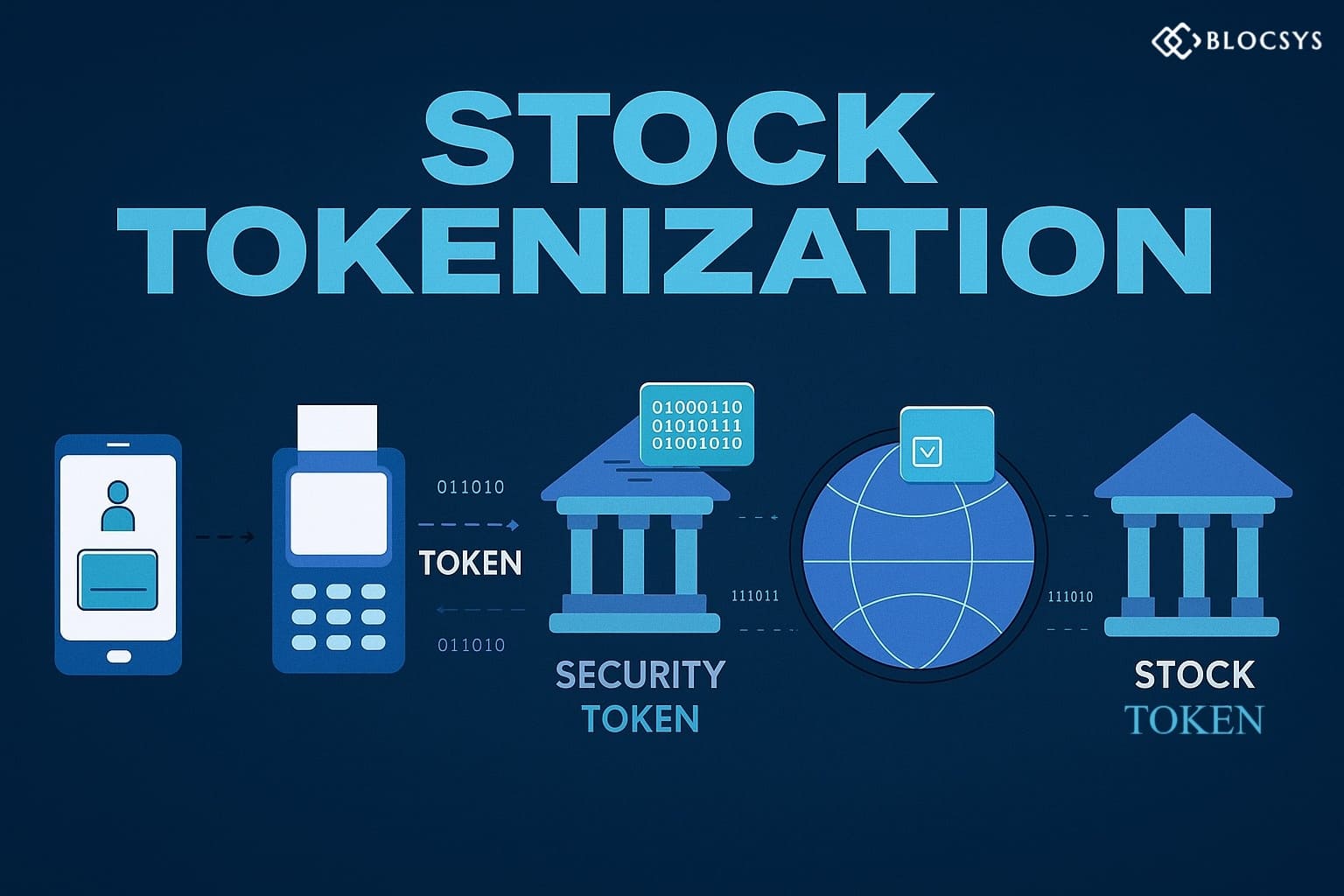The financial industry is changing quickly, and stock tokenization is one of the major developments that is changing established markets. Tokenized stocks are revolutionizing the way investors purchase, sell, and hold shares by fusing the strength of blockchain technology with established equity markets.
With proven expertise, Blocsys Technologies enables you to launch stock tokenization early in the market, driving real value and unlocking new transaction opportunities. Much like cryptocurrencies such as Bitcoin, Ethereum, and other digital assets, tokenized stocks are borderless and available to a global audience.We’ll go over what stock tokenization is, how it operates, its advantages, disadvantages, and why it might change the way people invest in the future in this blog.
What is Stock Tokenization?
Stock tokenization creates digital tokens on a blockchain that mimic ownership of actual stocks Every token represents an actual share that is under the custody of a financial institution with a license.
For example, through tokenization, an investor can purchase a part of a Tesla stock rather than a single full share which could cost hundreds of dollars. As a result, investing is more accessible and cheaper nation–wide.
How Does Stock Tokenization Work?
Tokenization connects decentralized finance (DeFi) and traditional finance (TradFi) Typically, the procedure goes like this:
- Custody of Shares – A regulated financial institution holds the underlying stock.
- Token Creation – A blockchain platform issues digital tokens equivalent to the shares (often on Ethereum using ERC-20 or ERC-1400 standards).
- Trading – Investors buy and sell these tokens on digital exchanges.
- Settlement –The blockchain records transactions instantly, reducing settlement times.
Benefits of Stock Tokenization
Tokenized stocks bring several advantages for both retail and institutional investors.
1. Fractional Ownership
Traditional stocks may be expensive, but tokenization allows investors to buy fractions of a share. This makes investing more affordable and inclusive.
2. 24/7 Trading
Tokenized stocks can trade anytime of day or night, just likeBitcoin and Ethereum & other cryptocurrencies can, unlike conventional stock exchanges that are only available during hours on established exchanges.
3. Faster & Cheaper Settlements
By cutting the settlement time from T+2 days to nearly instantaneous, blockchain reduces costs and risks.
4. Global Access
Globalized trading with no need for a local brokerage account.
5. Increased Liquidity
Tokenization increases liquidity by creating new secondary markets and enabling peer-to-peer trading.
Challenges of Stock Tokenization
While promising, stock tokenization is still in its early stages. Some challenges include:
- Uncertainty in regulations: Different nations and jurisdictions have different laws governing tokenized securities.
- Custody and compliance: Safeguarding the underlying assets is just as crucial as maintaining transparency.
- Adoption issues: Conventional organizations and investors are starting to get used to blockchain-based platforms.
Stock Tokenization vs. Traditional Stocks
| Feature | Traditional Stocks | Tokenized Stocks |
|---|---|---|
| Trading Hours | Limited (9:30–3:30) | 24/7 trading |
| Settlement | T+2 days | Near-instant |
| Accessibility | Region-specific | Global access |
| Fractional Ownership | Limited | Easy & affordable |
The Future of Stock Tokenization
Looking ahead, tokenization could revolutionize capital markets. Possible trends include:
- Tokenized IPOs accessible worldwide.
- Integration for staking, borrowing, and lending with DeFi.
- Hybrid exchanges offering both traditional and tokenized assets.
- Banks and investment funds have institutional credibility.
Tokenized securities are already being piloted by major financial services firms including NASDAQ, SIX Swiss Exchange, and JPMorgan, and this trend looks to be here to stay.
The Global Regulatory Environment
- A standardized framework for tokenized assets and digital securities is established by the Europe (MiCA Regulation).
- Germany (BaFin): Authorized tokenized securities and bonds inside a regulated environment.
- UK (FCA) – Piloting digital securities frameworks and exploring regulatory sandboxes.
- United States (SEC) – Cautious but testing pilots for security tokens.
Real-World Examples of Stock Tokenization
- SIX Digital Exchange (SDX) – Switzerland’s regulated exchange for tokenized stocks and bonds.
- Deutsche Börse’s D7 platform – For issuing and trading digital securities.
- NASDAQ blockchain experiments – Exploring hybrid trading platforms with faster settlement.
- JPMorgan Onyx – Focusing on tokenization of assets, including equities.
Questions and Answers (FAQ)
- Can I use tokenization to purchase fractional shares?
Ans. Yes, fractional ownership allows for the accessibility of expensive stocks. - Do tokenized stocks have the same value as actual shares?
Ans. It depends; some constructions are synthetic exposes, while others grant actual ownership. Verify the provider at all times. - Do tokenized stocks have voting rights or pay dividends?
Ans. While not all platforms ensure these rights, some do—through the automation of smart contracts. - Do market hours and time zones still restrict trading?
Ans. No, blockchain-based tokens enable trading anywhere in the world at any time. - Do regulations apply to tokenized stocks?
Ans. Regulation is changing; although frameworks differ by jurisdiction, tokenized securities must adhere to the same regulatory requirements as conventional ones.
Conclusion
Stock tokenization is a disruptive innovation to investing and provides globe–wide access, liquidity, and inclusivity. The opportunity for democratizing financial markets is clear and there are still challenges to solve.
Investors who are on board with this trend may have one of the first–mover advantages of what will be a larger financial revolution of our time.


